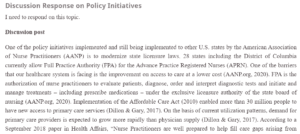Discussion Response on Policy Initiatives
Hello,
This was an excellent post. Nurse practitioners have the potential to be more impactful in the healthcare arena if only policy can be altered to allow for full practice. One such area is nurses serving on boards such as the FDA board. A study on nurses who serve on boards showed that there are four main reasons that the presence of nurses on boards is important. Nurses are very knowledgeable about a variety of healthcare issues; possess many skills such as leadership, problem-solving, and advocacy; offer a holistic perspective and unique patient-centred care; and are given opportunities to influence policy, leverage on the perspective of nursing, and capitalize on consumer trust. Nurse practitioners can influence the boards they are members of (Kaplan, 2018).
Nurse practitioners play a significant role in networking and community mentorship. Through establishing special interest groups and joint commissions, nurse practitioners can facilitate ongoing community partnerships in managing current health issues. The activities allow for the establishment of community initiatives by NPs that continually foster caregiving talent at a local level.
In reference to COVID-19, government officials are tasked with reviewing the community assessment and establishing policies in public health. The data guides officials on where, how, and when resources need to be allocated. Local government leaders depend on healthcare providers to provide relevant information on the health of the community. Through their participation in community assessments, NPs can help ensure that officials gather accurate and relevant information.
Lastly, COVID-19 brought a new era in advanced practice NP even as policy changes and emergency regulatory changes expanded the scope of practice for NPs. The changes allowed NPs to bolster the country’s response by working at full capacity in their training and education. The changes, however, are temporary. This should not be the case; even after the pandemic, NPs should continue working autonomously.
References
Kaplan, L. (2018). Nurse practitioners advocating through boards and commissions. The Nurse Practitioner, 43(11), 25-26.
ORDER A PLAGIARISM-FREE PAPER HERE
We’ll write everything from scratch
Question
Discussion Response on Policy Initiatives
I need to respond on this topic.
Discussion post
One of the policy initiatives implemented and still being implemented in other U.S. states by the American Association of Nurse Practitioners (AANP) is to modernize state licensure laws. 28 states, including the District of Columbia, currently allow Full Practice Authority (FPA) for the Advance Practice Registered Nurses (APRN). One of the barriers that our healthcare system is facing is the improvement in access to care at a lower cost (AANP.org, 2020). FPA is the authorization of nurse practitioners to evaluate patients, diagnose, order and interpret diagnostic tests and initiate and manage treatments – including prescribe medications – under the exclusive licensure authority of the state board of nursing (AANP.org, 2020).

Discussion Response on Policy Initiatives
Implementation of the Affordable Care Act (2010) enabled more than 30 million people to have new access to primary care services (Dillon & Gary, 2017). On the basis of current utilization patterns, demand for primary care providers is expected to grow more rapidly than physician supply (Dillon & Gary, 2017). According to a September 2018 paper in Health Affairs, “Nurse Practitioners are well prepared to help fill care gaps arising from shortages of primary care physicians”. Removing the scope of practice barriers is supported by decades of evidence and recommended by the National Council of State Boards of Nursing, the National Academy of Medicine (formerly the IOM), consumer advocacy organizations, and other leading health policy experts.
Strategies used in implementing the agenda are conducting proactive lobbying to change restrictive APRN regulations, campaigns and education on the role and value of APRN care to stakeholders including patients, and encouraging patient/consumers cared for by APRN’s to advocate for them as competent providers.
References:
2021 State Policy Priorities. (2020, November). Retrieved February 02, 2021, from https://www.aanp.org/
Dillon, D., & Gary, F. (2017). Full Practice Authority for Nurse Practitioners. Nursing Administration Quarterly, 41(1), 86-93. https://doi.org/10.1097/naq.

